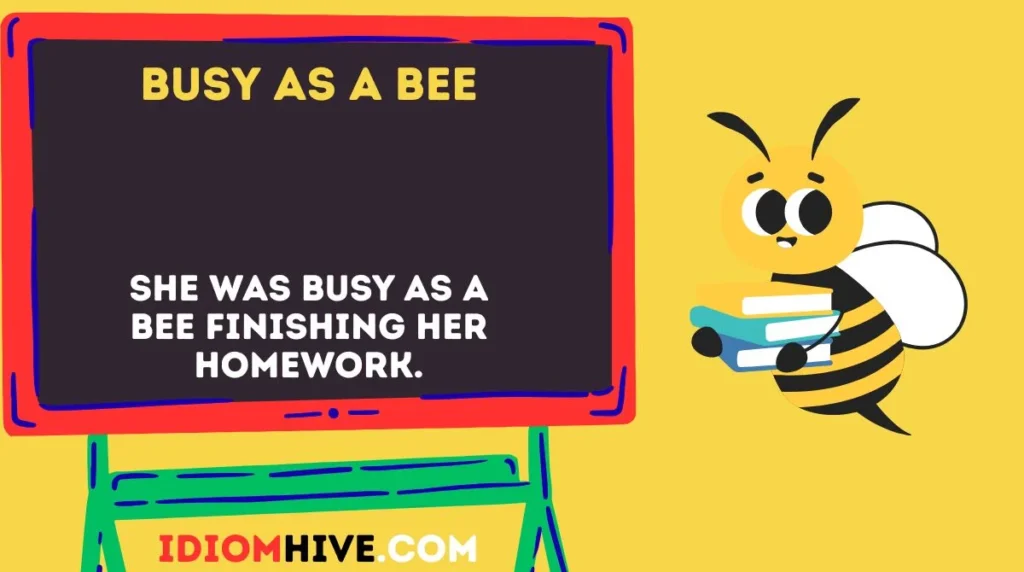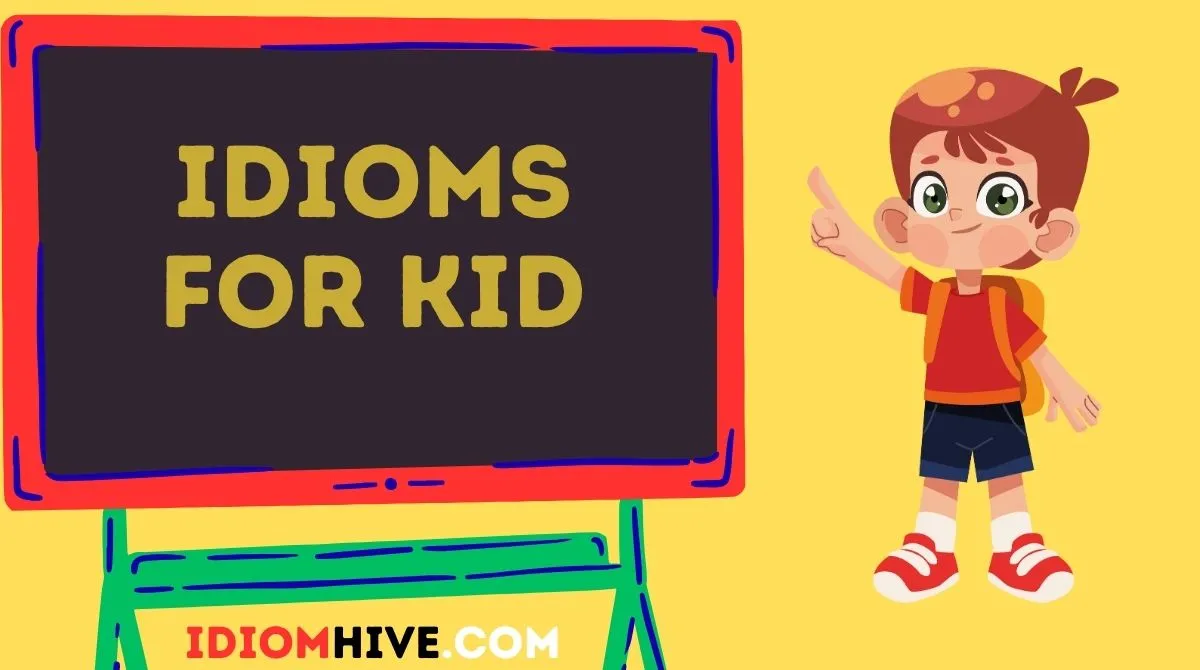Idioms are fascinating expressions in the English language. They are phrases that don’t always mean exactly what the words say, but instead carry a special meaning understood by native speakers.
Learning idioms helps children and learners of English not only improve their vocabulary but also understand conversations, books, and stories in a more natural way. When we talk about idioms for kids,
we mean simple, fun, and easy-to-grasp phrases that can make language learning exciting. These idioms often use playful images, animals, food, and everyday things, making them perfect for children.
By learning idioms, kids can improve storytelling, make their speech more colorful, and connect better with others. Teachers and parents also find idioms useful because they encourage creativity and a love for words.
In this guide, you will discover a wide collection of idioms for kids, their meanings, examples, and tips on how to use them in daily life.
Did You Know?
Many idioms kids use today, like “break the ice” or “under the weather,” are hundreds of years old. They started in old stories, plays, and songs, but are still alive in modern English. Fun fact: William Shakespeare is credited with introducing many idioms kids still hear today, such as “wild goose chase” and “in a pickle.”
Animal Idioms for Kids
A little bird told me
Meaning: I heard a secret from someone.
Sentence Example: A little bird told me you got full marks in your test!
Similar Idiom: Word on the street
Reflection: Used informally when talking about secrets or gossip.
Busy as a bee

Meaning: Very busy and active.
Sentence Example: She was busy as a bee finishing her homework.
Similar Idiom: Like a whirlwind
Reflection: Often used in daily conversations by parents or teachers.
Copycat
Meaning: Someone who copies another person.
Sentence Example: Stop being a copycat and draw your own picture.
Similar Idiom: Imitation game
Reflection: Popular among kids in playful settings.
Cry wolf
Meaning: To raise a false alarm.
Sentence Example: If you cry wolf too often, no one will believe you when it’s true.
Similar Idiom: False alarm
Reflection: A lesson-telling idiom, good for teaching honesty.
Let the cat out of the bag
Meaning: To reveal a secret by mistake.
Sentence Example: She let the cat out of the bag about the surprise party.
Similar Idiom: Spill the beans
Reflection: Used in friendly chats.
Hold your horses
Meaning: Wait a moment; slow down.
Sentence Example: Hold your horses, we’ll leave after lunch.
Similar Idiom: Hang on a second
Reflection: Common in daily instructions to kids.
Monkey business
Meaning: Silly or mischievous behavior.
Sentence Example: Stop the monkey business and pay attention in class.
Similar Idiom: Fooling around
Reflection: Used by adults to scold playful kids.
Fish out of water
Meaning: Feeling out of place.
Sentence Example: I felt like a fish out of water at the new school.
Similar Idiom: Out of one’s element
Reflection: Informal but easy for kids to relate to.
Wild goose chase
Meaning: A hopeless or pointless search.
Sentence Example: Looking for his toy in the attic was a wild goose chase.
Similar Idiom: Chasing shadows
Reflection: Fun phrase from old English, now used casually.
White elephant
Meaning: Something that is costly but not useful.
Sentence Example: That giant toy was a white elephant—it just sits in the corner.
Similar Idiom: Dead weight
Reflection: Rare for kids, but fun to learn.
Food Idioms for Kids
Piece of cake
Meaning: Something very easy.
Sentence Example: The spelling test was a piece of cake.
Similar Idiom: Easy as pie
Reflection: Very common in schools and homework talk.
Apple of my eye
Meaning: Someone very precious or loved.
Sentence Example: My little brother is the apple of my eye.
Similar Idiom: Treasure of my heart
Reflection: Sweet expression, often used by parents.
Butterflies in my stomach
Meaning: Feeling nervous.
Sentence Example: I had butterflies in my stomach before the speech.
Similar Idiom: Jitters
Reflection: Used for kids before exams or performances.
Big cheese
Meaning: An important person.
Sentence Example: The principal is the big cheese at our school.
Similar Idiom: Top dog
Reflection: Informal and humorous.
Cool as a cucumber
Meaning: Very calm and relaxed.
Sentence Example: She was cool as a cucumber during the exam.
Similar Idiom: Calm under pressure
Reflection: Daily conversation idiom.
Spill the beans
Meaning: Reveal a secret.
Sentence Example: Don’t spill the beans about the surprise gift.
Similar Idiom: Let the cat out of the bag
Reflection: Common in playful chats.
Couch potato
Meaning: Someone who sits around and watches TV too much.
Sentence Example: Stop being a couch potato and go outside to play.
Similar Idiom: Lazybones
Reflection: Informal, used by parents or teachers.
Full of beans
Meaning: Energetic and lively.
Sentence Example: The kids were full of beans after eating candy.
Similar Idiom: Bouncing off the walls
Reflection: Perfect for playful kids.
Sour grapes
Meaning: Pretending you don’t care for something you wanted but didn’t get.
Sentence Example: He said he didn’t want the toy, but that was just sour grapes.
Similar Idiom: Bitter feeling
Reflection: Teaches honesty in emotions.
Tough cookie
Meaning: A strong and brave person.
Sentence Example: She’s a tough cookie, even when things get hard.
Similar Idiom: Strong as steel
Reflection: Motivational idiom for kids.
Nature and Everyday Idioms for Kids
Break the ice
Meaning: Start a conversation.
Sentence Example: The teacher told a joke to break the ice on the first day.
Similar Idiom: Warm things up
Reflection: Great for school and social settings.
Under the weather
Meaning: Feeling sick.
Sentence Example: She stayed home because she was under the weather.
Similar Idiom: Not feeling well
Reflection: Daily life idiom.
Storm in a teacup
Meaning: Making a big fuss about something small.
Sentence Example: It was just a storm in a teacup when he lost his pencil.
Similar Idiom: Mountain out of a molehill
Reflection: Common in British English.
Out of the blue
Meaning: Something unexpected.
Sentence Example: He called me out of the blue yesterday.
Similar Idiom: All of a sudden
Reflection: Common in daily talks.
Every cloud has a silver lining
Meaning: There is something good in every bad situation.
Sentence Example: She was sad about the rain, but the rainbow reminded her every cloud has a silver lining.
Similar Idiom: Bright side
Reflection: Motivational phrase for kids.
Come rain or shine
Meaning: No matter what happens.
Sentence Example: He goes jogging every day, come rain or shine.
Similar Idiom: Through thick and thin
Reflection: Inspiring idiom, often in promises.
Chasing rainbows

Meaning: Trying to do something impossible.
Sentence Example: He was chasing rainbows by trying to fly with cardboard wings.
Similar Idiom: Pipe dream
Reflection: Used playfully.
Once in a blue moon
Meaning: Something that happens very rarely.
Sentence Example: We go to the amusement park once in a blue moon.
Similar Idiom: Hardly ever
Reflection: Common for storytelling.
On cloud nine
Meaning: Very happy.
Sentence Example: She was on cloud nine after winning the race.
Similar Idiom: Over the moon
Reflection: Everyday joyful idiom.
When pigs fly
Meaning: Something impossible.
Sentence Example: He’ll clean his room when pigs fly.
Similar Idiom: Never in a million years
Reflection: Humorous, perfect for kids.
People and Fun Idioms for Kids
Kid in a candy store
Meaning: Very excited and happy.
Sentence Example: He was like a kid in a candy store at the toy shop.
Similar Idiom: Over the moon
Reflection: Playful idiom kids enjoy.
Child’s play
Meaning: Very easy to do.
Sentence Example: Solving that puzzle was child’s play for her.
Similar Idiom: Piece of cake
Reflection: Common in classrooms.
Act your age
Meaning: Don’t behave younger than you are.
Sentence Example: Come on, act your age and stop whining.
Similar Idiom: Grow up
Reflection: Often used by parents.
In hot water
Meaning: In trouble.
Sentence Example: He was in hot water for breaking the vase.
Similar Idiom: In a pickle
Reflection: Daily life usage.
Sleep like a baby
Meaning: Sleep very well.
Sentence Example: I slept like a baby after playing all day.
Similar Idiom: Out like a light
Reflection: Common and comforting phrase.
Happy camper
Meaning: A cheerful and satisfied person.
Sentence Example: She was a happy camper after finishing her project.
Similar Idiom: In high spirits
Reflection: Friendly idiom for casual chats.
Pull someone’s leg
Meaning: Joke or tease someone.
Sentence Example: Don’t worry, I’m just pulling your leg.
Similar Idiom: Just kidding
Reflection: Informal and playful.
Two peas in a pod
Meaning: Two people who are very similar.
Sentence Example: The twins are like two peas in a pod.
Similar Idiom: Birds of a feather
Reflection: Fun, family-oriented idiom.
Out of the woods
Meaning: Out of trouble or danger.
Sentence Example: He’s feeling better now and out of the woods.
Similar Idiom: Safe and sound
Reflection: Used in both casual and serious situations.
Jump the gun
Meaning: To start too early.
Sentence Example: He jumped the gun and opened his gift before the party.
Similar Idiom: Too soon
Reflection: Informal phrase.
How to Use These Idioms in Daily Life
- In speaking: Use idioms in everyday conversations with friends, teachers, or family to make speech lively. For example, instead of saying “I was nervous,” say “I had butterflies in my stomach.”
- In writing: Add idioms in essays, stories, or diary writing to sound creative. Example: “The treasure hunt was a wild goose chase.”
- In professional use: Teachers, parents, or even young learners can use idioms in presentations or storytelling to keep the audience interested.
Common Mistakes Learners Make With Idioms
- Wrong: It was a piece of bread.
Correct: It was a piece of cake. - Wrong: He was on cloud seven.
Correct: He was on cloud nine. - Wrong: She spilled the water about the surprise.
Correct: She spilled the beans about the surprise.
FAQs
1. Why are idioms important for kids?
Idioms help kids understand cultural language, improve imagination, and make conversations fun.
2. Are idioms hard for children to learn?
Not if they are explained with examples and used in daily life. Kids learn them quickly when connected to stories or fun images.
3. Can idioms be used in school essays?
Yes, using idioms makes essays and stories more interesting, but they should fit naturally with the topic.
4. Do idioms mean the same in every language?
No, each language has its own idioms, though some may have similar meanings.
5. How many idioms should a child learn?
There’s no limit, but starting with 30–50 common idioms is a good way to build a strong foundation.
Conclusion
Idioms for kids are more than just funny or strange expressions; they are powerful tools to make language learning enjoyable. By using idioms, children can bring color to their words, sound more natural, and even connect better with friends and teachers. Whether it’s “busy as a bee,” “piece of cake,” or “on cloud nine,” each idiom carries a story and an image kids love. Start using them in daily conversations, stories, and even writing—you’ll see how they brighten up communication and spark creativity.
Meta Description for SEO
Discover 45+ fun and simple idioms for kids with meanings, examples, and usage tips. Perfect for learners, parents, and teachers to make English learning exciting and easy.










